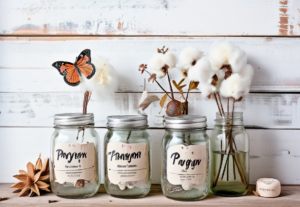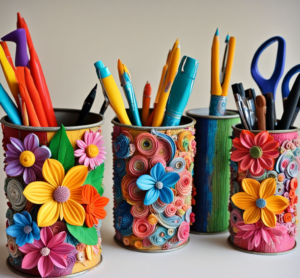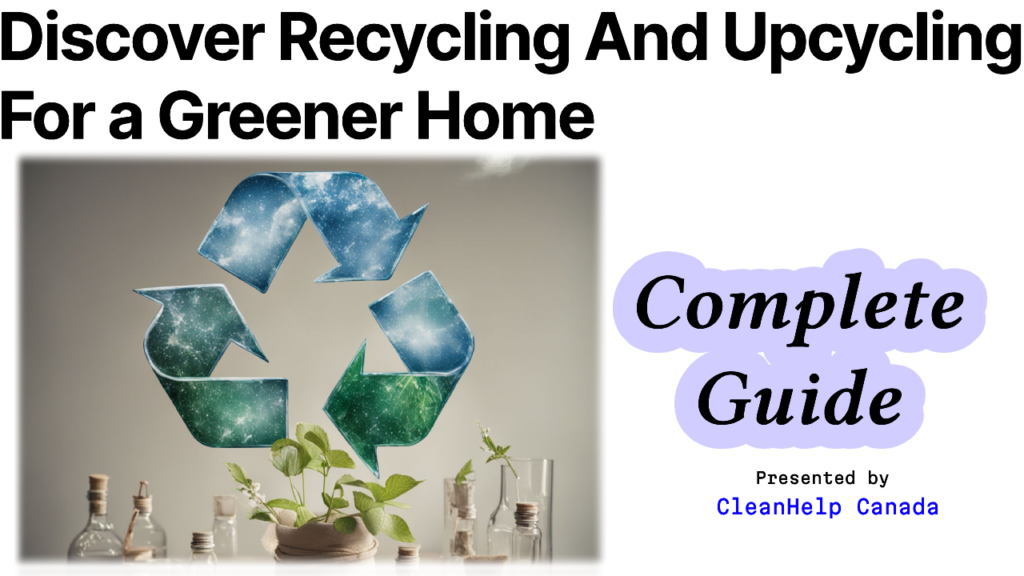In our increasingly eco-conscious world, sustainability has become more than just a trend—it’s a way of life. As people become more aware of their environmental footprint, they seek ways to reduce waste and make their homes more eco-friendly. Two effective approaches are recycling and upcycling, each offering unique benefits and playing a vital role in reducing waste. But how do you know which approach is best for your home? In this blog, we’ll explore the differences between recycling and upcycling, the advantages of each, and how to seamlessly incorporate these practices into your daily routine.
As we dive into these sustainable practices, it’s also important to remember that maintaining a clean and organized home is key to a healthy and happy living environment. Whether you’re recycling old items or upcycling them into something new, having a clutter-free space makes it easier to embrace these eco-friendly habits. That’s where CleanHelp Canada comes in. Based in London, Ontario, CleanHelp Canada offers affordable cleaning services that help you maintain a tidy and welcoming home, making it easier to adopt sustainable living practices like recycling and upcycling.
What is Recycling?

Recycling is the process of converting waste materials into new products. This practice is widely recognized for its environmental benefits, including conserving natural resources, saving energy, and reducing greenhouse gas emissions. In London, Ontario, the local recycling program is comprehensive, making it easy for residents to recycle common household items like paper, plastics, glass, and metals.
Common Recyclable Items in London, Ontario:
- Paper Products: Newspapers, magazines, cardboard, and office paper.
- Plastics: Bottles, containers, and certain packaging materials (usually marked with a recycling symbol).
- Glass: Bottles and jars, but not light bulbs or broken glass.
- Metals: Aluminum cans, tin cans, and certain metal containers.
Recycling these items not only helps conserve natural resources but also supports local industries that rely on recycled materials. For instance, recycled paper can be turned into new paper products, while recycled glass and metals can be used to create new containers or even new buildings. However, it’s important to note that not everything can be recycled. Items like plastic bags, Styrofoam, and electronics require special handling and should not be placed in your regular recycling bin.
Benefits of Recycling:
- Reduces Waste: Recycling helps keep waste out of landfills, reducing the amount of trash that needs to be managed.
- Conserves Resources: By recycling, we reduce the need to extract new raw materials from the earth, which helps preserve natural resources.
- Saves Energy: Manufacturing products from recycled materials often requires less energy than making them from new materials.
- Supports the Economy: Recycling supports jobs in the recycling and manufacturing industries and helps create new products from old materials.
In London, Ontario, recycling is made easy with the city’s curbside pickup program. Residents can simply sort their recyclables into blue bins and place them on the curb for collection. This convenience makes it easier than ever to do your part for the environment.
What is Upcycling?

While recycling is all about breaking down materials to create something new, upcycling takes a different approach. Upcycling is the creative process of repurposing old or discarded items into something of higher value or quality. Unlike recycling, which often degrades the material, upcycling enhances the original item, giving it a new life and purpose.
Popular Upcycling Ideas:
- Furniture Makeovers: Turn an old dresser into a stylish TV stand or refurbish wooden pallets into outdoor seating.
- Textile Crafts: Transform old t-shirts into a quilt or use fabric scraps to create decorative pillows.
- Creative Storage: Repurpose glass jars into storage containers for your kitchen or bathroom.
Upcycling allows you to personalize your home while contributing to environmental sustainability. It’s a fun and rewarding way to express creativity and make your living space unique without contributing to waste. Plus, upcycled items often carry a special meaning or story, making them great conversation pieces in your home.
Benefits of Upcycling:
- Reduces Waste: Upcycling keeps items out of the landfill and gives them a new purpose.
- Saves Money: Upcycling often uses materials you already have, reducing the need to buy new items.
- Encourages Creativity: Upcycling is a creative process that allows you to express your personal style.
- Creates Unique Items: Upcycled items are one-of-a-kind, adding character and individuality to your home.
In London, Ontario, there’s a growing community of upcyclers who share ideas and inspiration for transforming old items into something new. Whether you’re a seasoned DIY enthusiast or just starting, upcycling offers endless possibilities for creating a more sustainable home.
Recycling vs. Upcycling: Which is Better for Your Home?
When deciding between recycling and upcycling, it’s important to consider your goals, available resources, and the types of items you have on hand. Both practices offer significant environmental benefits, but they serve different purposes and can complement each other in your efforts to reduce waste.
Choose Recycling If:
- You have items that are commonly accepted in local recycling programs.
- You’re looking to reduce your environmental footprint with minimal effort.
- You want to support the production of new items made from recycled materials.
Choose Upcycling If:
- You enjoy DIY projects and want to add a personal touch to your home.
- There are items that cannot be recycled but could be repurposed.
- You want to reduce waste by reusing items creatively.
In many cases, a combination of both practices works best. Recycling can handle items that are difficult to repurpose, while upcycling offers a creative outlet for transforming things that might otherwise be discarded. By incorporating both recycling and upcycling into your lifestyle, you can significantly reduce waste and create a more sustainable home.
How to Get Started with Recycling in London, Ontario
Starting with recycling is straightforward in London, Ontario, thanks to the city’s comprehensive waste management programs. Here are some tips to help you recycle effectively:
- Check Local Guidelines: Make sure you’re aware of what can and cannot be recycled in your area. The City of London’s website provides detailed information on accepted materials.
- Sort Your Waste: Use separate bins for recyclables, compost, and trash. This makes it easier to dispose of items correctly.
- Clean Your Recyclables: Rinse out containers and remove any food residue before placing them in the recycling bin.
- Avoid Contaminants: Keep items like plastic bags, Styrofoam, and electronics out of your blue bin. These require special disposal methods.
By following these steps, you can ensure that your recycling efforts are effective and contribute to a cleaner environment.
Tips for Upcycling at Home
If you’re interested in upcycling, here are some simple projects to get you started:
- Furniture Makeover: Sand down an old wooden chair and repaint it to match your home’s décor. This is a quick and easy project that can transform a piece of furniture.
- Mason Jar Storage: Clean out old mason jars and use them to store kitchen essentials like rice, pasta, or spices. You can even decorate the lids for a custom look.
- T-Shirt Quilt: If you have a collection of old t-shirts, consider turning them into a cozy quilt. This project requires basic sewing skills and can create a meaningful keepsake.
Upcycling is all about creativity and resourcefulness. It’s a fantastic way to reduce waste while creating something beautiful and functional for your home. Plus, upcycling projects can be a fun and rewarding way to spend time with family and friends.
Integrating Recycling and Upcycling into Your Cleaning Routine
Maintaining a clean home is easier when you integrate sustainable practices like recycling and upcycling into your routine. For example, when you’re decluttering, consider whether items can be recycled or upcycled instead of thrown away. This approach not only reduces waste but also helps you stay organized.
CleanHelp Canada can play a crucial role in this process. Our deep cleaning services ensure that your home is not only spotless but also free from clutter, making it easier for you to focus on recycling and upcycling. Whether you’re looking to clear out old items or need help with regular maintenance, our team is here to assist. We offer affordable cleaning services tailored to your specific needs, so you can enjoy a cleaner, more sustainable home without the hassle.
Why Choose CleanHelp Canada?
At CleanHelp Canada, we understand the importance of a clean and sustainable home. Our affordable cleaning services are designed to help you maintain a tidy and welcoming space, allowing you to focus on sustainable practices like recycling and upcycling. We offer a range of services, from deep cleaning to regular maintenance, all tailored to meet your specific needs.
Whether you’re starting with small steps like recycling common household items or diving into creative upcycling projects, CleanHelp Canada is here to support you. We’re committed to providing top-quality service with a focus on sustainability, helping you create a home that’s not only clean but also environmentally friendly.
Visit CleanHelp Canada to learn more about our services and how we can help you achieve a cleaner, greener home.
By incorporating both recycling and upcycling into your lifestyle, you can make a significant impact on the environment while creating a unique and personalized home. Whether you’re just starting or looking to expand your efforts, these sustainable practices offer endless possibilities for reducing waste and promoting a greener future. And with the support of CleanHelp Canada, maintaining a clean and eco-friendly home has never been easier.
